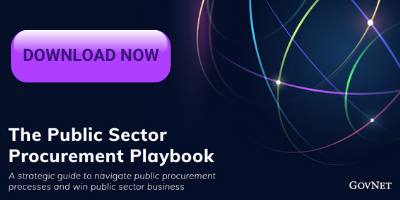7 Steps to Help You Win Public Sector IT Contracts
Public sector contracts represent roughly £300 billion worth of business for suppliers and service providers each year. For those targeting these lucrative deals, the competition is stiff. For IT suppliers, competition can be even more difficult as today’s demands for efficient technology that solve a myriad of problems the public sector is facing are bigger than ever - and only increasing.
.jpeg?width=600&name=cowomen-pd5FVvQ9-aY-unsplash%20(1).jpeg)
With a public sector focused on digital transformation and digitising responses due to the coronavirus pandemic, effective IT services are on many organisations’ sights. But before you can begin supplying, you’ll first need to win contracts. Here’s how to do it.
What Is the Procurement Process?
From the public sector's perspective, procurement is where goods and/or services are acquired from either in-house providers or third parties. This is done through competitive bidding or a ‘tendering’ process, where third parties bid for public sector contracts.
Procurement is achieved through a tendering or competitive bidding process. It's used to ensure the buyer receives goods, services or works at the best price and most transparent process possible. The process spans across the whole lifecycle from identifying needs through to the end of a services contract.
From the public sector organisation perspective, procurement looks like this:
- The organisation prepares a brief and chooses the procurement method to use.
- The opportunity is then advertised.
- Tender documents are issued to potential bidders.
- Tender responses are received and evaluated.
- Suppliers are notified and given feedback.
- Observe the standstill period - a pause between notifying bidders of the contract award decision and the final contract conclusion.
- Award the contract.
From the supplier's side, bidding is a continuous cycle of bidding, winning, losing and improvement. Even a loss can provide valuable learning on what to do in the future to achieve success. But what kind of knowledge can you have on hand from the beginning?
Tips for Preparing Bids
1. Know the Buyer
By analysing the tender accurately, you can identify precisely what the client is looking for. Then, you can adapt your bid according to those specific needs.
2. Develop a Plan
A plan needs relevant people who are positioned in the best way to provide input and insight. It then needs the input to be channelled through a small team of bid overseers.
This means you aren't spreading your plan too thin by requiring information from too many disparate groups and you can maintain consistency within the overall presentation. Potential clients want to see a bid with razor-sharp focus. As they say, too many cooks spoil the broth.
3. Keep it Simple
While some briefs have limits on the length and others don’t, it’s still worth being concise.
Too much information that rambles on muddies the waters - and what clients really appreciate is clarity. Necessary details should be presented professionally and should be to the point.
4. Differentiate Yourself From the Competition
What makes you different from all the others bidding for the same contract? Clients are looking for solutions that give them the best deal - how will you supply that? It isn't simply about providing a service but also about providing the most value for money.
How will you go the extra mile?
5. Context Is King
Knowing the client is evidently a benefit, but you must also know the wider market. What’s the business environment like that this specific tender may inhabit? Do those circumstances influence your bid or the state of the contract itself? Does it affect the future of the contract?
Having answers to these questions helps to prepare you for any future eventualities.
6. Emphasise Your Sustainability
We aren't specifically talking about environmental concerns here, but more like how you can entertain sustainable business continuity throughout times of hardship or uncertainty that might affect the wider business environment or the tender in particular.
You need to show your proposal will positively impact the long-term and your organisation will be there throughout the tender’s lifecycle.
Include the following:
- Are you in a good position to offer a sustained service?
- How will your service or solution benefit the client?
- How will your service or solution benefit citizens, society or the local community?
7. Create a Tender Library
If your bid is successful, use it (and others) to create a tender library. This is a good way of displaying your ability to provide an effective service to clients in future bidding and tendering processes. It also shows you can satisfy their needs.
Advice for Winning IT Contracts
IT contracts involve very specific, technologically-driven needs. From your point of view, you need to develop a deep understanding of these needs and the problem you are trying to solve. This means doing research into the end-users - the ones that will be using your solutions. Contract bidders need to :
- Test any prior assumptions you have about these users.
- Research about the range of users you might be working with, alongside what kind of solutions they use and how they like to use them.
- Make sure that the needs of the user are built into any tender response.
- Find out if your solution is a replacement for another system, if so, find out what was good and bad about your predecessor.
You also need to remember that you will be evaluated as more than an individual, but as a team and as a company with wider connections. Public sector organisations are not just looking at you, they’re also looking at your partners and stakeholders.
Remember to utilise digital selling tools, such as e-procurement tools. Similarly, register on the Digital Marketplace to ensure that you are cleared for providing digital services to public organisations.
For an in-depth look at securing digital contracts, you can explore the Digital Buying Guide for more information.
IT and tech providers should also gain an understanding of the Technology Code of Practice, which is a set of criteria to help government bodies design and buy technology. It will help you understand the kind of things that public sector organisations are looking for, in order to more accurately design solutions and tender responses for them.
Along the same lines, buyers will also be using the ‘buying technology’ guidance from the ‘Government technology standards and guidance’ resources. Knowledge of this guidance will allow suppliers to align themselves with what tech-buying public sector organisations are on the lookout for.
If you’re looking for more information on procurement and how you can become more successful in the procurement market, download our guide.
The Public Procurement Playbook
Want to learn more about the public sector procurement process and win more public sector business? Download the Public Procurement Playbook.
Topics Covered Include:
- Public Procurement Trends & Stats
- How to Target and Find Contracts
- Improving Sales Potential & Outreach Tips
- Tips for Winning Contracts
- Managing the Bid Process
- Links to Other Useful Resources



